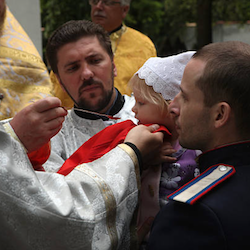
By Peter Bringe, Pastor of Covenant Family Church (Wentzville, MO)
Some people today argue for paedocommunion, the idea that all covenant children should automatically be admitted to Communion on the grounds of their covenant membership without qualifications like knowledge of the gospel and a profession of faith.
It is not uncommon for Baptists who have become convinced of infant baptism to wonder, why baptize infants but require a credible profession of faith for the Lord’s Supper? And yet, the near universal position historically among Reformed churches has been to admit covenant children to the Lord’s table who profess faith in Christ and are of years and ability to examine themselves.
In critiquing paedocommunion, I like to begin with a comparison between circumcision and the Passover. In the Old Testament, God strictly commanded that the infants of his people be circumcised (Gen. 17:9-14). This was to be done on the eighth day, probably for both symbolic and practical reasons. God sought to put Moses to death because his son was uncircumcised (Ex. 4:24-26). Thus, there is strong precedent for applying the initiatory sign and seal of the covenant to infants of believers. But God did not command that children eat the yearly Passover. Only the men were commanded to go up to Jerusalem three times a year for the feasts (Deut. 16:16-17). If a foreigner wanted to partake, he and all the males in his household were to be circumcised so that he could partake (Exod. 12:48).
It could be objected that only the men were required to attend the feasts in Jerusalem for practical reasons. This is probably true in part. At least, that is probably why women were not required to come (Calvin explains the exemption by saying, “through the fecundity promised them by God, they were almost always either pregnant or nursing”). But it could likewise be said that the apparent participation of all the children in the first Passover in Egypt was also for practical reasons – the Passover meal was also their dinner that night. The alternative would have been to have the young children fast.
From historical sources, we know in the 2nd century BC it was men twenty years old and over who ate the Passover. In the 1st century BC it became the practice that the age was lowered to 13. It was after the temple was destroyed that Passover returned to the household and the issue of women and children eating Passover arose (with some controversy due to the presence of wine). So in New Testament times, as when Jesus celebrated the Passover with his disciples, the norm was for Passover to be celebrated by “sons of the commandment,” men ages thirteen and above.
And these feasts are not the only precursor to the Lord’s Supper. By referring to the “blood of the covenant,” Jesus referred to the covenant ceremony of Exodus 24, where only Israel’s leaders partook of the meal. And different sacrifices had different rules for who would eat of them.
And so unlike baptism, the Lord’s Supper has a less clear Old Testament precedent with regard to who would partake. In the Old Testament, not all covenant members were required to eat of the meal. And with respect to paedocommunion, it is not a question of whether the children of believers are members of the covenant (they are!), but whether the Lord’s Supper is to be given to all covenant members without qualification.
The next step is to recognize the differences between baptism and the Lord’s Supper. Baptism symbolizes our new birth, in which God does something to us and we respond to it the rest of our lives. Baptism is a sign of entrance into the covenant. It is done once. Infants who are baptized are to grow up into an understanding of their baptism and more and more exercise faith in the promises symbolized by it. The Lord’s Supper is a sign of covenant renewal. It is administered and received often. The Lord Supper symbolizes our ongoing participation and growth by feeding on Christ, in which the Lord gives and we take, which we do in a certain knowledgable manner – doing it in remembrance of Christ, feeding on Christ by faith.
Then we must consider the text which provides the clearest direction for partaking of the Lord’s Supper: 1 Corinthians 11. In this passage, the apostle Paul gives directions on how to partake of the Lord’s Supper which limit the partakers to those who profess faith, examine themselves, and discern the Lord’s body. It must not be taken in an “unworthy manner” (11:27). Therefore a person must “examine himself” (11:28). To avoid bringing judgment on oneself, one must “discern the body” (11:29, 10:16-17), that is, understand the significance of the Lord’s Supper and embrace its implications; and one must “judge” oneself in repentance (11:31). And it is for all Christians who meet these qualifications – male and female, rich and poor – as a communal meal for the church, to be consciously received as a seal that binds us to love one another as fellow members of Christ (10:17, 11:21-22, 33).
And even as the individual has a duty to examine himself, so the church has a duty to guard the holy things and judge those inside the church, admitting them or restricting them from the Lord’s Supper (1 Cor. 5, Matt. 7:6). So to partake of it, a person is examined by the elders of the church concerning his/her knowledge of Christ, faith in him, and repentance. The elders admit children to the Lord’s table who are of years and ability to examine themselves, who have a sufficient understanding of the gospel and the Lord’s Supper, profess faith in Christ, and are resolved to lead a Christian life.
A church could become too stringent in its demands. The early Congregationalists of New England were too stringent in their requirements for communicant membership in their desire for a pure and regenerate church, a significant factor in early New England history. The elders should realize that they cannot see the invisible church and that the plants in rocky soil and good soil look similar at first. Elders should look for a credible profession of faith, a knowledgeable one that is not being contradicted by scandalous behavior. The Supper is not just for strong, confident Christians with a long track record of good fruit. It is a means of grace intended to build up believers, to nourish our weak and weary souls.
The shepherds of the church should be diligent to teach and exhort the whole church, including noncommunicant members, unto faith in Christ and repentance unto God. Additionally, parents have a vital role with respect to their children. They should be diligent to train their children in the faith, to raise them as fellow saints, and to urge them from the beginning to receive and rest upon the Lord Jesus (Eph. 6:4). They should do so, so that in time the children are ready and eager to profess their faith before men and partake of the Lord’s Supper for their further growth in the grace of Christ.
